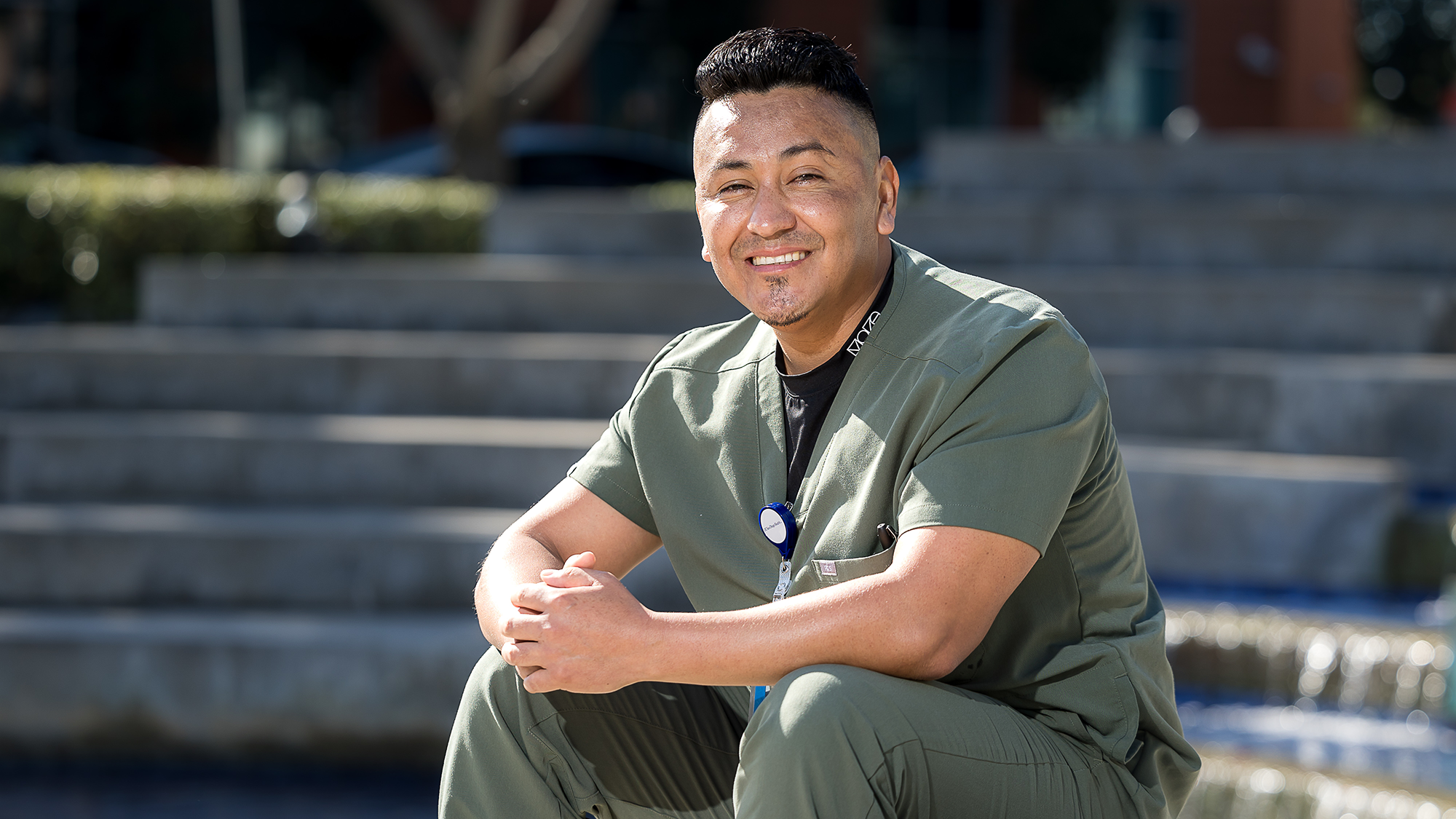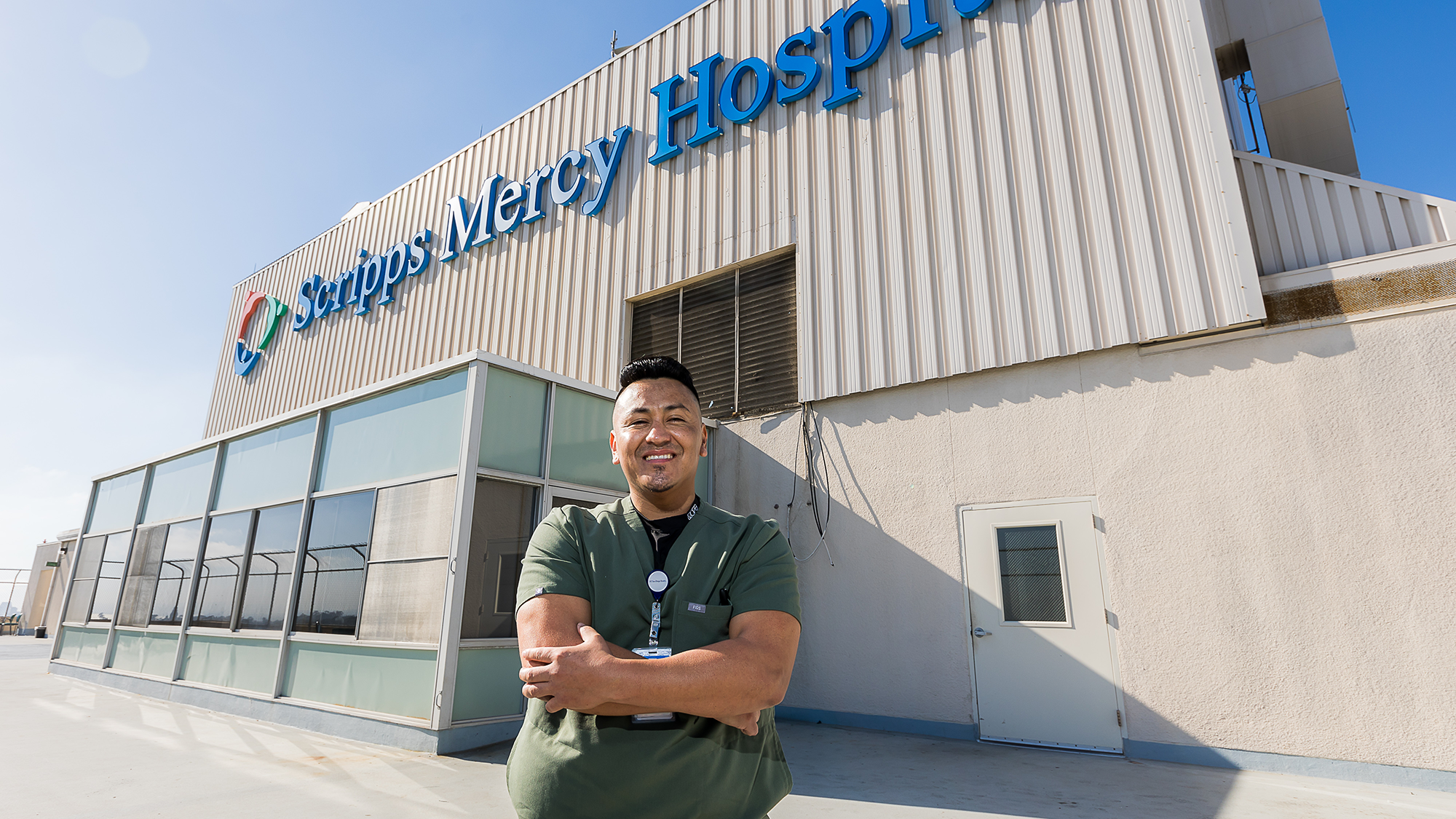
I think I was hired for my current position as a hospital patient transporter technician largely because I am a part of this program: it showed my commitment to pursuing a career in the healthcare sector, which was well-received by my employer.
Israel Guzman, Healthcare Administration Pathways graduate
Sometimes falling into a YouTube rabbit hole leads to life-changing things. For Israel Guzman, it meant learning about the San Diego Workforce Partnership’s free career resources and training programs. “I heard about [the Workforce Partnership] from watching a video on YouTube. There was a panel in which a speaker was talking about how they help people who are having a hard time finding jobs or to provide training,” Israel reflects.
Intrigued—and convinced it was too good to be true—he Googled “Workforce Partnership” and learned that the organization did in fact offer free training programs to job seekers in San Diego County. He reached out and got connected with Construction Career Jumpstart (CCJ), an accelerated construction program in partnership with the Electrical Training Institute (ETI). He completed CCJ but ultimately decided that such a labor-intensive industry wasn’t right for him.
A New Opportunity in a New Industry
Israel was 10 years old when he and his family moved to Los Angeles. He applied for citizenship three times and was finally accepted in 2022. But still, he struggled to find work: “The only jobs I could get were short-term and unsustainable and certainly nothing that I was actually interested in. I used to work a graveyard shift at a liquor store.“
For years, working in healthcare was more of an abstract idea than a concrete career goal for Israel. “I had always been interested in working in healthcare, but coming from an immigrant family, no one in my family had worked in that field,” he says. Israel knew that his lack of professional experience in healthcare, and in general, would be a weakness; he knew that he would be competing against other job seekers with degrees in nursing and years of experience working in hospitals, clinics or medical offices. Determined not to let this inhibit his ability to pursue this career pathway, Israel started volunteering with UC San Diego’s hospitals. After a two-and-a-half-month waiting period, he started volunteering in the emergency department.

At the same time that he began volunteering, Israel reconnected with the Workforce Partnership, this time applying for the Healthcare Administration Pathways (HAP) program. “I wish I knew about HAP sooner! Through this program I could earn a certificate and enter the healthcare industry,” Israel states. “I think I was hired for my current position as a hospital patient transporter technician largely because I am a part of this program: it showed my commitment to pursuing a career in the healthcare sector, which was well-received by my employer.”
Not only will Israel earn a specialized certificate in medical coding, information management, and clinical documentation—he also will exit HAP with a wealth of job-readiness training. “Career development services provide crucial support and resources for individuals like me, who are older, with limited opportunities, and starting late in the game. My experience with the Workforce Partnership revealed individuals facing similar challenges, showing that you’re not alone and giving me hope to keep going.”
While still enrolled in HAP, Israel began looking ahead to his next steps. He’s starting a medical imaging certificate program in early 2024 with Smith Chason School of Nursing. He plans to work as a Magnetic Resonance Imaging (MRI) technologist, operating specialized equipment that uses magnetic fields and radio waves to create detailed images of the body. As an equipment operator, he’ll be considered a skilled tradesman. This recognition has a tangible benefit—he’ll have a specialized skillset that is in demand by hospitals around the world. And he’ll have the opportunity to work in the same hospitals, clinics and medical offices that once told him he didn’t have enough experience.
Career development services provide crucial support and resources for individuals like me, who are older, with limited opportunities, and starting late in the game. My experience with the Workforce Partnership revealed individuals facing similar challenges, showing that you’re not alone and giving me hope to keep going.
Israel Guzman, Healthcare Administration Pathways graduate
Shifting Mindsets Around Healthcare Careers
Like many young adults, working in the “trades” wasn’t presented as a desirable career pathway while Israel was in high school. “The mindset needs to shift,” Israel says. “Young people only see one path forward: four years of college and then another two or four years to earn a master’s degree to become a lawyer or doctor. No one tells them that a good plumber or electrician earns $100,000 in a year because these jobs are still considered ‘lower-tier jobs’. It’s only after a young person becomes over-educated and under-skilled that they understand the value of hard skills. After all, if your plumbing breaks at the night, do you want someone to come and teach you how to fix it and leave, or do you want the plumber to come and fix it?,” he notes.
For Israel, earning more money isn’t about acquiring more possessions. “The truth is that money equals freedom. And the more freedom you have, the more good you can do in this world,” Israel says smiling. This freedom comes from years of hard work, perservance and catching a video on YouTube that opened up a world of possibilities. “Sometimes to connect the dots, you have to look backwards.”
